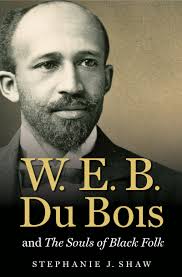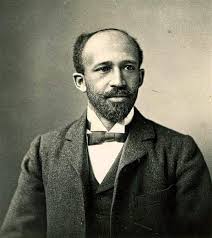The Souls of Black Folk Page #24
The Souls of Black Folk is a 1903 work of American literature by W. E. B. Du Bois. It is a seminal work in the history of sociology and a cornerstone of African-American literature. The book contains several essays on race, some of which the magazine Atlantic Monthly had previously published.
I will not say such arguments are wholly justified,—I will not insist that there is no other side to the shield; but I do say that of the nine millions of Negroes in this nation, there is scarcely one out of the cradle to whom these arguments do not daily present themselves in the guise of terrible truth. I insist that the question of the future is how best to keep these millions from brooding over the wrongs of the past and the difficulties of the present, so that all their energies may be bent toward a cheerful striving and cooperation with their white neighbors toward a larger, juster, and fuller future. That one wise method of doing this lies in the closer knitting of the Negro to the great industrial possibilities of the South is a great truth. And this the common schools and the manual training and trade schools are working to accomplish. But these alone are not enough. The foundations of knowledge in this race, as in others, must be sunk deep in the college and university if we would build a solid, permanent structure. Internal problems of social advance must inevitably come, —problems of work and wages, of families and homes, of morals and the true valuing of the things of life; and all these and other inevitable problems of civilization the Negro must meet and solve largely for himself, by reason of his isolation; and can there be any possible solution other than by study and thought and an appeal to the rich experience of the past? Is there not, with such a group and in such a crisis, infinitely more danger to be apprehended from half-trained minds and shallow thinking than from over-education and over-refinement? Surely we have wit enough to found a Negro college so manned and equipped as to steer successfully between the dilettante and the fool. We shall hardly induce black men to believe that if their stomachs be full, it matters little about their brains. They already dimly perceive that the paths of peace winding between honest toil and dignified manhood call for the guidance of skilled thinkers, the loving, reverent comradeship between the black lowly and the black men emancipated by training and culture. The function of the Negro college, then, is clear: it must maintain the standards of popular education, it must seek the social regeneration of the Negro, and it must help in the solution of problems of race contact and cooperation. And finally, beyond all this, it must develop men. Above our modern socialism, and out of the worship of the mass, must persist and evolve that higher individualism which the centres of culture protect; there must come a loftier respect for the sovereign human soul that seeks to know itself and the world about it; that seeks a freedom for expansion and self-development; that will love and hate and labor in its own way, untrammeled alike by old and new. Such souls aforetime have inspired and guided worlds, and if we be not wholly bewitched by our Rhinegold, they shall again. Herein the longing of black men must have respect: the rich and bitter depth of their experience, the unknown treasures of their inner life, the strange rendings of nature they have seen, may give the world new points of view and make their loving, living, and doing precious to all human hearts. And to themselves in these the days that try their souls, the chance to soar in the dim blue air above the smoke is to their finer spirits boon and guerdon for what they lose on earth by being black. I sit with Shakespeare and he winces not. Across the color line I move arm in arm with Balzac and Dumas, where smiling men and welcoming women glide in gilded halls. From out the caves of evening that swing between the strong-limbed earth and the tracery of the stars, I summon Aristotle and Aurelius and what soul I will, and they come all graciously with no scorn nor condescension. So, wed with Truth, I dwell above the Veil. Is this the life you grudge us, O knightly America? Is this the life you long to change into the dull red hideousness of Georgia? Are you so afraid lest peering from this high Pisgah, between Philistine and Amalekite, we sight the Promised Land? VII. Of the Black Belt I am black but comely, O ye daughters of Jerusalem, As the tents of Kedar, as the curtains of Solomon. Look not upon me, because I am black, Because the sun hath looked upon me: My mother’s children were angry with me; They made me the keeper of the vineyards; But mine own vineyard have I not kept. THE SONG OF SOLOMON. Out of the North the train thundered, and we woke to see the crimson soil of Georgia stretching away bare and monotonous right and left. Here and there lay straggling, unlovely villages, and lean men loafed leisurely at the depots; then again came the stretch of pines and clay. Yet we did not nod, nor weary of the scene; for this is historic ground. Right across our track, three hundred and sixty years ago, wandered the cavalcade of Hernando de Soto, looking for gold and the Great Sea; and he and his foot-sore captives disappeared yonder in the grim forests to the west. Here sits Atlanta, the city of a hundred hills, with something Western, something Southern, and something quite its own, in its busy life. Just this side Atlanta is the land of the Cherokees and to the southwest, not far from where Sam Hose was crucified, you may stand on a spot which is to-day the centre of the Negro problem,—the centre of those nine million men who are America’s dark heritage from slavery and the slave-trade. Not only is Georgia thus the geographical focus of our Negro population, but in many other respects, both now and yesterday, the Negro problems have seemed to be centered in this State. No other State in the Union can count a million Negroes among its citizens,—a population as large as the slave population of the whole Union in 1800; no other State fought so long and strenuously to gather this host of Africans. Oglethorpe thought slavery against law and gospel; but the circumstances which gave Georgia its first inhabitants were not calculated to furnish citizens over-nice in their ideas about rum and slaves. Despite the prohibitions of the trustees, these Georgians, like some of their descendants, proceeded to take the law into their own hands; and so pliant were the judges, and so flagrant the smuggling, and so earnest were the prayers of Whitefield, that by the middle of the eighteenth century all restrictions were swept away, and the slave-trade went merrily on for fifty years and more.
Translation
Translate and read this book in other languages:
Select another language:
- - Select -
- 简体中文 (Chinese - Simplified)
- 繁體中文 (Chinese - Traditional)
- Español (Spanish)
- Esperanto (Esperanto)
- 日本語 (Japanese)
- Português (Portuguese)
- Deutsch (German)
- العربية (Arabic)
- Français (French)
- Русский (Russian)
- ಕನ್ನಡ (Kannada)
- 한국어 (Korean)
- עברית (Hebrew)
- Gaeilge (Irish)
- Українська (Ukrainian)
- اردو (Urdu)
- Magyar (Hungarian)
- मानक हिन्दी (Hindi)
- Indonesia (Indonesian)
- Italiano (Italian)
- தமிழ் (Tamil)
- Türkçe (Turkish)
- తెలుగు (Telugu)
- ภาษาไทย (Thai)
- Tiếng Việt (Vietnamese)
- Čeština (Czech)
- Polski (Polish)
- Bahasa Indonesia (Indonesian)
- Românește (Romanian)
- Nederlands (Dutch)
- Ελληνικά (Greek)
- Latinum (Latin)
- Svenska (Swedish)
- Dansk (Danish)
- Suomi (Finnish)
- فارسی (Persian)
- ייִדיש (Yiddish)
- հայերեն (Armenian)
- Norsk (Norwegian)
- English (English)
Citation
Use the citation below to add this book to your bibliography:
Style:MLAChicagoAPA
"The Souls of Black Folk Books." Literature.com. STANDS4 LLC, 2025. Web. 7 Jan. 2025. <https://www.literature.com/book/the_souls_of_black_folk_310>.




Discuss this The Souls of Black Folk book with the community:
Report Comment
We're doing our best to make sure our content is useful, accurate and safe.
If by any chance you spot an inappropriate comment while navigating through our website please use this form to let us know, and we'll take care of it shortly.
Attachment
You need to be logged in to favorite.
Log In